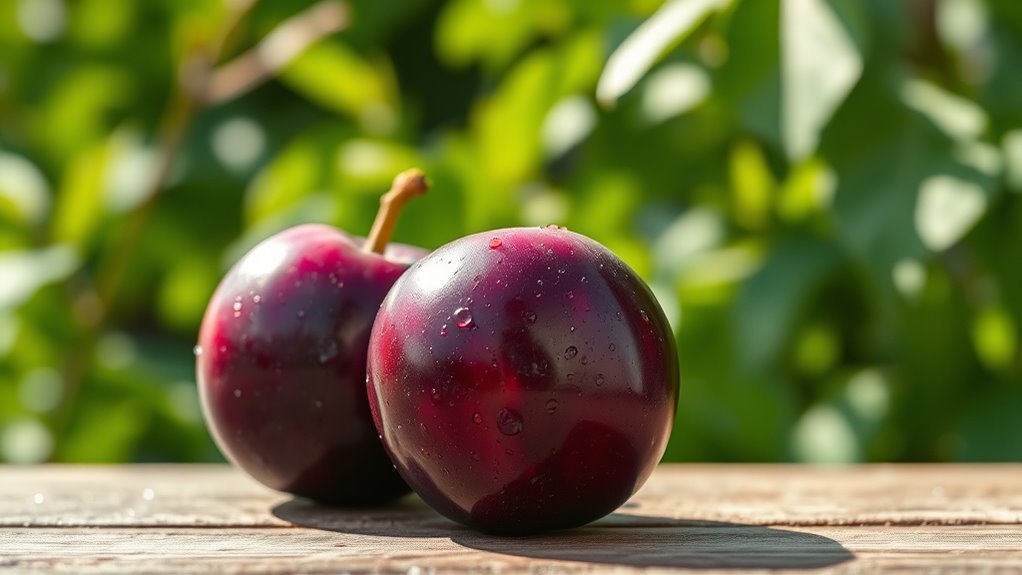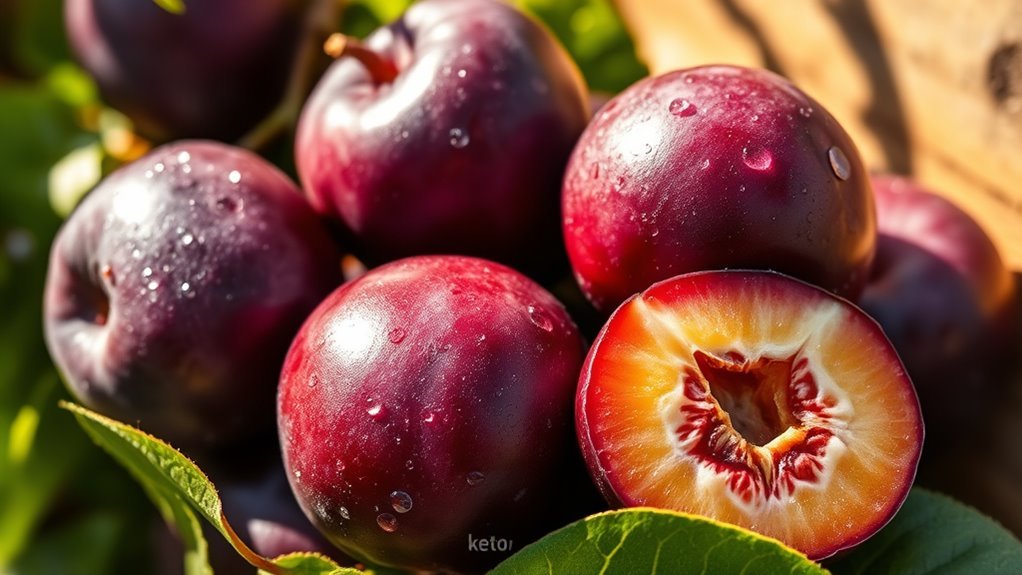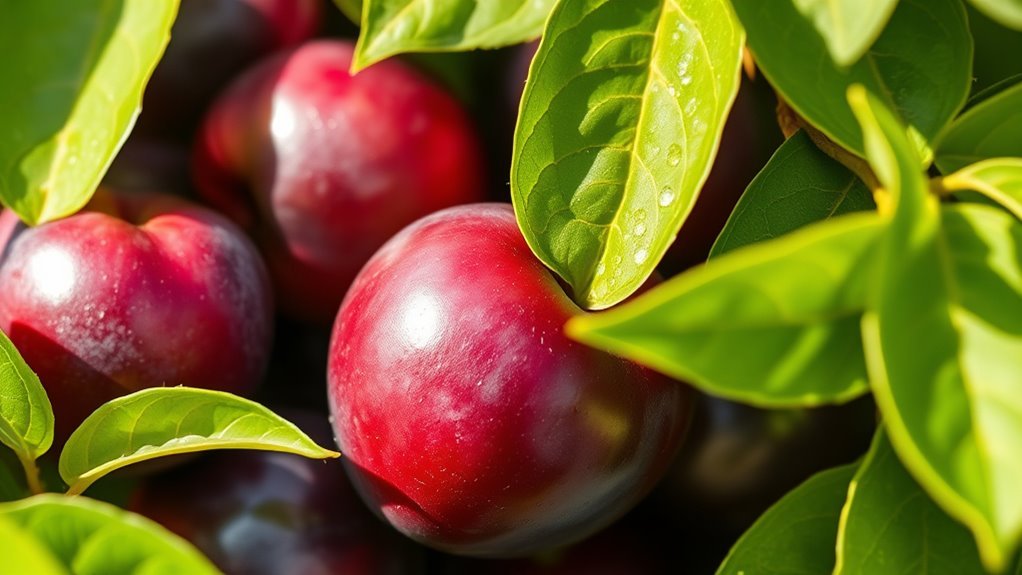Plums can be keto-friendly when enjoyed in moderation. A medium-sized plum contains about 7 grams of carbohydrates, allowing you to savor their taste without exceeding your carb limits. Their health benefits, such as antioxidants and vitamins, make them a nutritious choice. Just remember to practice portion control and pair them with low-carb foods to maintain your keto goals. Stay with us to explore more about plums and other keto-friendly options.
Understanding the Keto Diet

Understanding the Keto Diet is essential if you’re considering this low-carb eating plan. At its core, the keto principles revolve around drastically reducing carbohydrate intake while increasing the consumption of healthy fats. This shift encourages your body to enter a state of ketosis, where it burns fat for energy instead of glucose. You’ll find that incorporating healthy fats—like avocados, nuts, and olive oil—can help you feel satiated and energized throughout the day. This approach not only supports weight loss but can also improve mental clarity and overall well-being. By embracing the keto lifestyle, you’re giving yourself the freedom to explore a variety of delicious, nutritious foods that align with your health goals, all while enjoying the benefits of fat as your primary energy source.
Nutritional Profile of Plums

When considering plums, it’s important to look at their nutritional profile, especially if you’re following a keto diet. You’ll want to analyze their carbohydrate content, fiber and sugar levels, and the vitamins and minerals they provide. Understanding these factors can help you make informed choices about incorporating plums into your meal plan.
Carbohydrate Content Analysis
Although plums are often celebrated for their vibrant flavor and juiciness, their carbohydrate content is an essential factor to take into account, especially for those following a ketogenic diet. Here’s a quick breakdown of the carbohydrate content in plums:
- Average Carbs: A medium-sized plum contains about 7 grams of carbs.
- Net Carbs: After fiber, net carbs can be around 6 grams, depending on the variety.
- Keto Alternatives: If you’re seeking lower-carb options, consider using plum varieties such as the Japanese plum or exploring other keto alternatives like berries.
Being mindful of these numbers can help you make informed choices while enjoying the benefits of plums without derailing your keto journey.
Fiber and Sugar Levels
The nutritional profile of plums includes not just carbohydrates but also significant fiber and sugar levels that impact their overall health benefits. Plums are a decent fiber source, providing about 2 grams of fiber per 100 grams. This fiber aids digestion and can help keep you feeling full, making them a valuable addition to your diet. However, plums also contain natural sugars, around 10 grams per 100 grams, which may influence your keto journey. If you’re looking to reduce sugar intake, consider using fiber sources like chia seeds or psyllium husk as sugar substitutes in recipes. Balancing the fiber and sugar content in your diet is essential to maintain health and support your keto goals.
Vitamins and Minerals Present
Plums are not just a tasty snack; they also pack a punch regarding vitamins and minerals. These fruits are rich in plum nutrients that can enhance your health. Here’s a quick look at their vitamin benefits:
- Vitamin C: Supports your immune system and aids in collagen production.
- Vitamin K: Vital for bone health and helps in blood clotting.
- Vitamin A: Promotes good vision and supports skin health.
In addition to these vitamins, plums provide essential minerals like potassium and magnesium, which can help regulate blood pressure and maintain muscle function. Including plums in your diet can be a delicious way to boost your nutrient intake while enjoying a keto-friendly lifestyle.
Carbohydrate Content in Plums

While many fruits are often off-limits for those following a keto diet due to their high carbohydrate content, plums can be a more manageable option. A typical medium-sized plum contains around 7.5 grams of carbohydrates, which isn’t too high compared to other fruit choices. If you’re mindful of portion sizes, you can enjoy various plum varieties as a revitalizing snack without overstepping your daily carb limits. These fruits can even be incorporated into keto snacks, adding a burst of flavor while keeping your diet on track. Just remember, moderation is key. By choosing plums wisely, you can savor their taste and nutritional benefits while staying true to your keto lifestyle. Enjoy the freedom of including plums in your meal plan!
Comparing Plums With Other Fruits
When evaluating fruit options on a keto diet, it’s helpful to compare plums with other common fruits. Plums, belonging to various plum varieties, can be a tempting choice, but you should weigh them against other options. Here are three fruit comparisons to take into account:
When considering fruits for a keto diet, it’s essential to compare plums with other low-carb options.
- Berries: Low in carbs and high in antioxidants, berries like strawberries and raspberries are generally more keto-friendly than plums.
- Avocados: Technically a fruit, avocados offer healthy fats and minimal carbs, making them an excellent choice for your keto lifestyle.
- Melons: While watermelon is hydrating, it has a higher carb count compared to plums, so moderation is key.
Health Benefits of Plums
Plums offer a nutrient-rich profile, packed with vitamins and minerals that support overall health. Their antioxidant properties can help combat oxidative stress, promoting better wellness. Additionally, plums are known for their digestive health benefits, making them a valuable addition to your diet.
Nutrient-Rich Profile
Although often overlooked, the nutrient-rich profile of plums offers a variety of health benefits that can enhance your overall well-being. These fruits are packed with essential vitamins and minerals, making them a great addition to your diet. Here are three key benefits:
- Rich in Vitamins: Plums are excellent vitamin sources, particularly vitamin C and K, which support immune function and bone health.
- Improved Nutrient Absorption: The fiber in plums aids digestion and helps your body absorb nutrients more efficiently.
- Hydration: With high water content, plums keep you hydrated, promoting overall health.
Incorporating plums into your meals can provide these benefits while adding a burst of flavor to your diet. Enjoy the freedom of healthier choices!
Antioxidant Properties
Rich in vitamins and fiber, plums also boast impressive antioxidant properties that can greatly benefit your health. These antioxidants, such as anthocyanins and phenolic compounds, help combat oxidative stress and reduce inflammation in your body. Different plum varieties, like European and Japanese plums, offer varying levels of these beneficial antioxidants, so you can choose based on your taste preferences and health goals. Incorporating plums into your diet can enhance your overall wellness by supporting cellular health and potentially lowering the risk of chronic diseases. So, if you’re looking for a delicious way to boost your antioxidant intake, plums could be a perfect addition to your meals and snacks. Enjoy the freedom of nourishing your body with nature’s bounty!
Digestive Health Benefits
When you’re looking to improve your digestive health, incorporating plums into your diet can be a game-changer. These fruits are packed with nutrients that support your digestive system and provide several plum benefits:
- Rich in Fiber: Plums are high in dietary fiber, which promotes regular bowel movements and helps prevent constipation.
- Supports Digestive Enzymes: The natural sugars and organic acids in plums aid in the production of digestive enzymes, enhancing nutrient absorption.
- Hydration: With their high water content, plums keep you hydrated, which is essential for a well-functioning digestive system.
How to Incorporate Plums in a Keto Diet
Incorporating plums into a keto diet can be a delightful way to add flavor and nutrients without greatly impacting your carb intake. You can enjoy plum smoothies by blending fresh plums with low-carb ingredients like spinach, almond milk, or protein powder. This creates a rejuvenating drink that satisfies your sweet cravings while keeping carbs in check. Additionally, consider making plum salads. Combine sliced plums with leafy greens, nuts, and a low-carb dressing for a nutritious side dish. You can also experiment by adding plums to cheese boards or yogurt, keeping your meals exciting and diverse. With these methods, you’ll enjoy the benefits of plums while staying aligned with your keto lifestyle.
Portion Control and Plums
When it comes to enjoying plums on a keto diet, serving size matters considerably. You’ll need to be aware of the carb count in plums to guarantee they fit within your daily limits. Balancing your plum intake with healthy fats can help maintain your overall nutritional goals while still satisfying your cravings.
Serving Size Matters
How much is too much when it comes to enjoying plums on a keto diet? Serving sizes and portion control play an essential role in maintaining your carb intake. To enjoy plums without disrupting your keto goals, consider these guidelines:
- Limit to one medium plum: This offers a satisfying taste while keeping carbs in check.
- Monitor your overall fruit intake: Pair plums with low-carb options to balance your diet.
- Stay aware of portion sizes: Use measuring tools or visuals to guarantee you’re not overindulging.
Carb Count Awareness
Understanding the carb count of plums is essential for anyone on a keto diet. These fruits, while delicious, contain about 7 grams of carbohydrates per medium-sized plum. If you’re mindful of your daily carb limit, practicing carb awareness is vital. Portion control can help you enjoy plums without compromising your keto goals. You might consider having just half a plum or pairing it with high-fat foods to maintain keto flexibility. This way, you can satisfy your sweet tooth while staying within your desired carb range. Remember, moderation is key. By being intentional about how many plums you consume, you can enjoy these fruits and still adhere to your ketogenic lifestyle.
Balancing With Fats
To enjoy plums while adhering to a ketogenic diet, balancing them with healthy fats is essential. Incorporating plums into your meals can be delightful, but keep portion control in mind. Here are three ways to balance your plums with fats for ideal keto snacks:
- Pair with Nut Butters: Spread almond or peanut butter on plum slices for a satisfying snack.
- Add Cheese: Combine plums with full-fat cheese for a creamy, rich treat that complements their sweetness.
- Mix with Avocado: Create a unique salad by tossing diced plums with avocado, adding healthy fats and fiber.
Recipes Featuring Plums for Keto
When it comes to incorporating plums into a keto diet, you’ll find a variety of delicious recipes that can satisfy your sweet cravings without derailing your carb intake. For a tasty treat, try making keto-friendly plum desserts, like almond flour plum muffins or a low-carb plum crumble using erythritol as a sweetener. These options allow you to indulge without guilt.
Alternatively, consider savory plums in dishes such as a grilled chicken salad topped with diced plums and a light vinaigrette. This combination offers a revitalizing contrast, enhancing the meal’s flavor while keeping it keto-compliant. With these easy recipes, you can enjoy plums in both sweet and savory ways, making your keto journey more enjoyable.
Alternatives to Plums on Keto
What can you enjoy instead of plums while sticking to your keto diet? If you’re looking for delicious plum substitutes that are also keto friendly fruits, consider these options:
- Berries: Strawberries, raspberries, and blackberries are low in carbs and packed with antioxidants.
- Avocado: This creamy fruit is not only low in sugar but also rich in healthy fats, making it a versatile choice.
- Olives: They offer a unique flavor and are high in healthy fats, making them a great snack option.
These alternatives can help satisfy your cravings while keeping your carb count in check. By incorporating these keto-friendly fruits, you can enjoy a variety of flavors without compromising your diet.
Making Informed Choices With Plums
While exploring alternatives to plums on your keto journey, it’s important to understand how to make informed choices if you decide to include them in your diet. Not all plum varieties are created equal; some contain more carbohydrates than others, which can impact your ketosis. For instance, black plums generally have lower carb counts compared to their yellow counterparts.
Be wary of health misconceptions surrounding fruits. Many believe that all fruits are off-limits on keto, but moderate consumption of certain plums can fit your lifestyle. Track your intake carefully and balance it with your overall macros. Ultimately, choosing the right plum variety and understanding their nutritional profile can empower you to enjoy these fruits without derailing your keto goals.
Frequently Asked Questions
Can I Eat Plums on a Strict Keto Diet?
You can eat plums on a strict keto diet, but in moderation. Notably, a medium plum contains about 7 grams of carbs. While they offer benefits like antioxidants and vitamins, it’s vital to limit your intake to stay within your carb goals. Instead, consider incorporating plums as an occasional treat or a rejuvenating addition to keto snacks. Balancing enjoyment and dietary restrictions allows you to savor the freedom of your food choices.
What Is the Glycemic Index of Plums?
The glycemic index of plums is around 24, which means they have a low glycemic impact. This makes them a better choice compared to higher-glycemic fruits. If you’re looking for fruit alternatives while managing your carbohydrate intake, plums can be a satisfying option in moderation. Just keep in mind your overall daily carb limit, and you can enjoy the sweetness of plums without spiking your blood sugar levels.
Are Dried Plums Keto-Friendly?
Dried plums, often known as prunes, aren’t typically considered keto-friendly due to their higher sugar content compared to fresh fruits. When dried, fruits lose water but retain their sugars, making them more calorie-dense. If you’re following a strict keto diet, it’s best to limit or avoid dried fruit like prunes. Instead, focus on low-carb alternatives to satisfy your cravings while staying within your carb limits.
How Do Plums Affect Ketosis?
Plums can be a sweet temptation on your keto journey, but they’re not without consequences. With their natural sugars, they can disrupt ketosis, pulling you away from your goals. Plum nutrition offers vitamins and fiber, yet their carbohydrate content may tip the scales. If you’re seeking freedom in your lifestyle, it’s wise to enjoy them sparingly. Keeping track of how they affect your ketosis is essential for staying on course.
Can Plums Lead to Weight Gain on Keto?
Plums can lead to weight gain on keto if consumed excessively, given their natural sugars. While plum nutrition offers benefits like vitamins and antioxidants, moderation is key. You should keep track of your carb intake, as even healthy fruits can disrupt weight management goals if eaten in large amounts. Incorporating a small portion of plums might work for some, but be mindful of how it fits into your overall ketogenic diet.
Frequently Asked Questions about Plums and Keto Diet
1. Are plums low in carbohydrates?
Yes, plums are relatively low in carbohydrates compared to many other fruits. A medium-sized plum contains approximately 7-8 grams of carbohydrates, with about 6 grams of sugar. However, if you’re following a strict ketogenic diet, it’s important to track your total carbohydrate intake, as even low-carb fruits can add up quickly.
2. Can I eat plums on a keto diet?
While plums can be included in moderation, they are not the most keto-friendly fruit. Due to their natural sugar content, consuming more than a few plums could potentially kick you out of ketosis. It is advisable to limit your intake to one or two plums and balance it with other low-carb foods throughout the day.
3. What is the glycemic index of plums?
The glycemic index (GI) of plums is relatively low, ranging from 24 to 53, depending on the variety and ripeness. Foods with a low GI are absorbed more slowly, causing a gradual rise in blood sugar levels. This makes plums a better option compared to high-GI fruits, but portion control is still important for maintaining ketosis.
4. What are some keto-friendly alternatives to plums?
If you’re looking for keto-friendly fruit alternatives, consider options like avocados, berries (such as raspberries and strawberries), and olives. These fruits are lower in carbohydrates and can be enjoyed in larger portions while still supporting a ketogenic diet.
5. How can I incorporate plums into a keto diet?
To incorporate plums into a keto diet, consider using them as a small addition to salads, smoothies, or yogurt. You can also enjoy them as a snack in moderation. Just be sure to account for their carbohydrate content within your daily allowance to ensure you stay on track with your keto goals.
References
- https://www.healthline.com/nutrition/are-fruits-keto-friendly
- https://www.medicalnewstoday.com/articles/323189
- https://www.ncbi.nlm.nih.gov/pmc/articles/PMC5855205/
- https://www.dietdoctor.com/low-carb/fruits
- https://www.verywellfit.com/keto-diet-food-list-4588997
- https://www.ketogenic.com/keto-diet-foods/
- https://www.washingtonpost.com/wellness/2020/12/23/keto-diet-fruits/
- https://www.mayoclinic.org/healthy-lifestyle/nutrition-and-healthy-eating/expert-answers/keto-diet/faq-20458563


